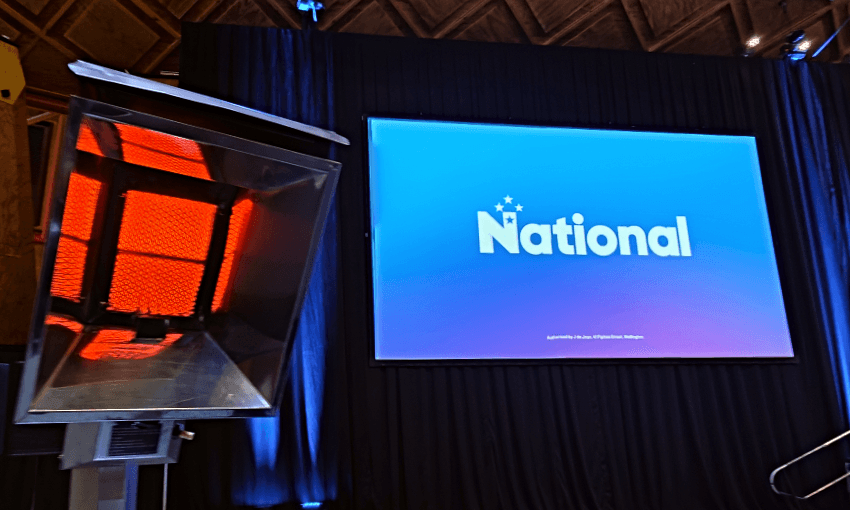Labour got a lot of mentions. But there were a couple of parties almost entirely ignored, writes Toby Manhire.
What’s the mood, I asked a National MP on my way into the Due Drop Events Centre yesterday morning. A victory lap? “Well, no, not really,” he insisted. “Humble,” he said. “Humility,” he said. “You know, there’s a lot to do.”
Inside, it looked like they had taken the stoic thing a bit far. The heating had conked out for the weekend, and the seven or eight tardis-like patio heaters weren’t doing much. Demonstrating that you understand the realities of the cost of living crisis is one thing, but this was ridiculous. And it was really, really cold. Delegates – who had parted with $350 to attend – sat huddled around round tables in coats, parkas, puffer jackets and a scattering of royal blue official-issue zip-up fleeces. The scene looked less like the 88th annual conference of New Zealand’s most successful political party than a horticulture society getting briefed ahead of a day of shrubbery planting by the local estuary.
Eleven months earlier, the last time National gathered at this south Auckland venue, the temperature was higher in more ways than one as Christopher Luxon officially launched his party’s campaign. His podium then said “Get our country back on track”. Yesterday that was upgraded to “Getting New Zealand back on track”. But that was the least of the differences. In 2023, the event seemed to want to bring the energy of a Las Vegas UFC title fight. This time it was a markedly more sober, workmanlike effort.
And that – borked heating notwithstanding – was very much by design. It wasn’t joyless. There was an eagerness to thank the party faithful, and the Live Laugh Luxon mugs quickly sold out. But even in acknowledging achievements, the importance of noting what remained to be done was palpable. There was no place for self-congratulation, certainly not flamboyance.
Something else that was noticeable for its absence: the coalition partners. In her Saturday speech, deputy leader Nicola Willis hailed not a National-led government but a “National government”. She referenced the Labour Party six times, but words such as “Act”, “New Zealand First” and “coalition” didn’t warrant a mention. Nor did they in Luxon’s big speech on Sunday, though both Labour and the Greens got a name check – for “ushering in an era of lawlessness”.
To be fair, Willis did acknowledge the coalition partners in introducing Luxon on Sunday, but that was about it. The Act and NZ First parties were mentioned many fewer times – honestly – than John Key’s cat, Molly.
Fair enough, as far as it goes: this is a party conference not a government rally. And after nine months of an unprecedented three-part coalition, with the small parties determined to avoid the MMP pitfall of fading into the background, when it often looks like the tails are wagging the dog, well, you can hardly blame National for wanting to have a weekend in which they get to play the music uninterrupted.
And yet amid reports that the message being delivered to Luxon is get us back to the good old John Key days of 40-something-per-cent poll results, the unavoidable corollary of restoring that level of popularity is coalition partners getting pared back, if not flattened, in the process. If you think Act and NZ First are noisy today, just imagine what they might sound like a year out from an election if they’re slipping towards oblivion while National thrives.
That is for another day. In his first conference keynote as prime minister, Luxon pitched it just right for the crowd and the moment. The speech was focused, unfussy and completely forgettable. The policy piece, a “maths action plan” to tackle a “total system failure” that showed 63% of year eight students are tracking more than a year behind the curriculum benchmark, will see a new curriculum expedited and enhanced professional development for teachers.
Luxon said it should be “bigger than politics”; Labour responded that he would say that, given it was the fruit of the last National government’s national standards approach. The union warned that it would load pressure on teachers without bringing results. But the metrics reported are genuinely shocking. And in Erica Stanford, Luxon has an MVP minister. She was one of three (along with Simeon Brown and Chris Bishop) graded nine out of 10 by Audrey Young the other day. Yesterday, she was repeatedly praised by Luxon in his speech, generating three separate ovations. “She’s doing awesome,” he said.
And with that, a diligent, spirited conference, absent both coalition heat and central heating, was done. The closest it came to controversy was in a session on infrastructure and housing earlier on Sunday, when an eloquent grandmother asked a question. Given how important language was, she said, noting that the words on the screen earlier had pointed to “military-style academies”, rather than “boot camps”, how about quitting the use of the term “granny flats”?
The panel appeared flummoxed. A murmur of discontent rippled through the crowd. That sounds like something the officials in the Ministry of the Environment would say, half-joked Chris Bishop. “We’re very woke in the National Party,” three-quarter-joked Chris Penk. Look, said Bishop, granny flat is the vernacular, and when you want people to understand what you’re talking about you use the vernacular. The audience burst into applause. A couple of people took to their feet and raised their arms. Surely they weren’t going to flatten the granny? I needn’t have worried. They were holding their hands up to the patio heater.

